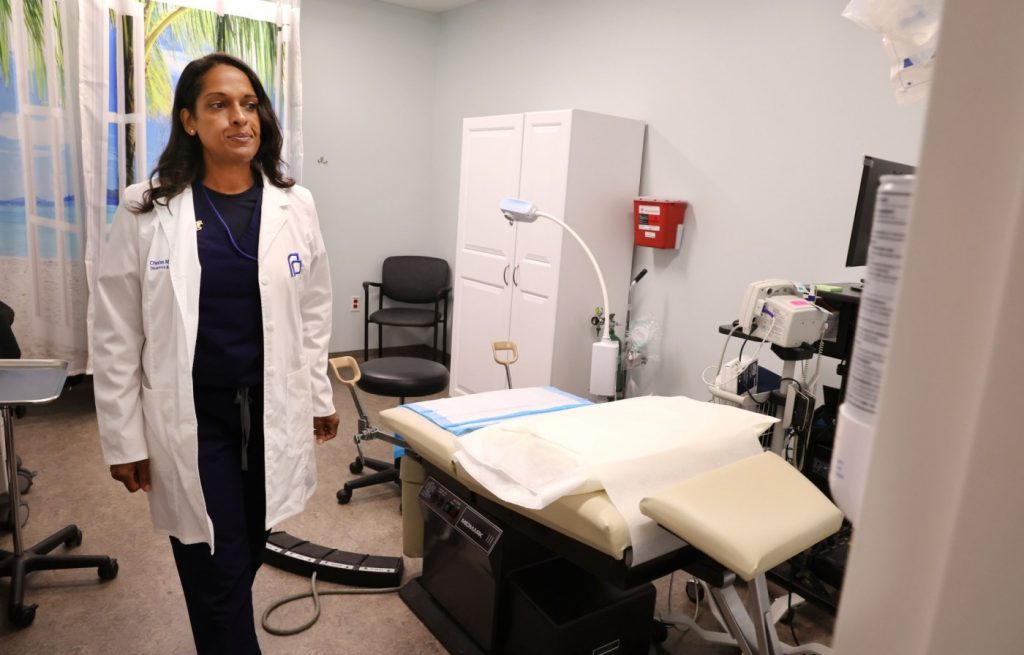On Tuesday, the reality of Florida’s new six-week abortion ban hit the radar of pregnant women seeking care.
At a Planned Parenthood clinic in West Palm Beach, doctors scrambled to provide abortions for anyone pregnant beyond six weeks. Women crowded into a waiting room, returning for a pill or surgical procedure. The men who brought them paced the parking lot or sat in cars watching for the women to emerge.
Yet, even with the scramble, the clinic turned some women away, a glimpse into the future of reproductive care in Florida.
A recent Florida Supreme Court ruling paved the way for the Sunshine State to enforce a six-week ban on abortions beginning May 1. However, Florida law requires two doctor visits, at least 24 hours apart, to get a medication or surgical abortion. So anyone six weeks pregnant or more arriving Tuesday at a clinic learned they must travel outside the state for abortion care. Rather than an abortion, they received a flyer with resources.
“I am going to get in today,” said Cathy, pacing the sidewalk outside a Palm Beach County clinic in her gray sweatshirt and green paisley pajama bottoms. Waiting for her procedure later in the afternoon, the 20-something said she had not known about the six-week ban. “I couldn’t have traveled.”
Dr. Cherise Felix, an obstetrician and gynecologist at Florida Mango Health Center, a Planned Parenthood clinic in West Palm Beach, inside the recovery room on Tuesday. (Carline Jean/South Florida Sun Sentinel)
Dr. Cherise Felix, an ob-gyn with Planned Parenthood in West Palm Beach, said she had no idea how late she would be working on Tuesday, but recognized Wednesday would signal a new routine.
“We’re prepared to go as late as we have to today,” Felix said. “Tomorrow I won’t be able to offer my patients what I offered them yesterday.”
For the last two years, abortion has been legal in Florida through 15 weeks. Florida lawmakers put that restriction into effect after the U.S. Supreme Court in June 2022 overturned Roe v. Wade, which had protected the right to have an abortion. Before that court decision, abortions were legal in Florida through 24 weeks.
The state has about 50 clinics that provide abortions, and in 2023 they provided some 84,000 procedures — about 51,000 of them after six weeks of gestation.
Starting May 1, when a women arrives pregnant at a clinic, she will receive a sonogram to measure the gestational age of the fetus.
Dr. Cherise Felix, an obstetrician and gynecologist at Florida Mango Health Center, a Planned Parenthood clinic in West Palm Beach, walks into the patients’ waiting room on Tuesday. (Carline Jean/South Florida Sun Sentinel)
“That will be a lot more emotional for our sonographers who will have to convey that gestational age to the patient,” Felix said. “If it’s more than six weeks, that’s when the realization sets in that this is going to be more of a challenge.”
Related Articles
Florida’s 6-week abortion ban takes effect
A Kentucky lawmaker had a nonviable pregnancy. State abortion bans made her loss more agonizing
Doctors race against Florida’s six-week abortion ban
Arizona House passes bill to repeal 1864 abortion ban
Gov. Newsom wants to let Arizona doctors provide abortions in California
Patient navigators for abortion clinics and abortion funds already are receiving calls and referrals from clinics, and setting up appointments in other states with less restrictive laws.
“Women are scared and angry that they have to travel out of state,” said Lana’e Hernandez, a patient navigator with Planned Parenthood of Southwest and Central Florida. “They tell us, ‘I appreciate your support but I am upset and angry about having to do this is the first place.’”
Navigators at Florida’s Planned Parenthood and independent clinics already have been rerouting women who would have traveled to Florida for an abortion. On Tuesday, they began rerouting Florida women, too.
Some women have never been to an airport, never downloaded a plane ticket and never used Uber.
“They need one-on-one assistance,” Hernandez said. “There is a lot to help them figure out.”
Hernandez said the nearest clinic that will provide abortion care after six weeks is more than 700 miles away, making travel by car more challenging. The states bordering Florida have restrictive laws, too. Georgia has a six-week ban, and in Alabama abortion is illegal.
Elizabeth Londono, a patient navigator with Planned Parenthood of South, East and North Florida said the organization has expanded its team and added multilingual speakers to prepare for the increase in women who will need to travel for care. States with less restrictive bans than Florida have various rules, so the right choice might depend on a women’s specific situation. For example, North Carolina allows abortion up to 12 weeks and has a 72-hour waiting period between visits. Virginia, though a bit further, allows abortion thorugh 26 weeks, six days of pregnancy and does not have a waiting period.
“Our staff explains everything to them, and then it’s their preference we try to acommodate,” Londono said.
Jessica Hatem’s organization, Emergency Medical Assistance Abortion Fund, serves Palm Beach County and the Treasure Coast and works with independent clinics to help them finance travel for patients.
“There’s a certain mount of savviness it takes to reach out to someone for help,” she said. “They are trusting someone to make arrangements for them to leave the state. When they first get to us they are angry. We offer them a sense of hope.”
Hatem’s is one of five funds in the state that help patients at indepedent abortion clinics with travel costs. She said the new law puts pressure on the network of100 funding groups like hers trying to provide financial aid and resources to women seeking abortions. Funds are used to cover the costs of flights, hotels, transportation and meals. Her group has helped women travel to North Carolina, Illinois, the Baltimore-Washington, D.C. area and Virginia.
While Planned Parenthood provides other health services, independent clinics traditionally have focused solely on abortion care. Presidential Women’s Center in West Palm Beach had a full waiting room on Tuesday and women waiting in cars in the parking lot for their turn. On Wednesday, the crowds will thin.
“The plans are to stay open and provide reproductive health care as best they can within the law,” said Louis Silver, attorney for the center. “The hope is that the ban will be overturned in November. We hope this is a short-term problem that voters will take care of.”
In November, Florida voters will decide on Amendment 4, which will guarantee access to abortion through viability (about 24 weeks). Right-to-life organizations and reproductive rights advocates are working to get voters to the polls. The amendment would need the approval of 60% of voters to pass.
On Wednesday, Felix, who has been providing abortion care for 17 years, says her work will shift. She will provide more prenatal care, infertility care, well-woman checks and other health services.
“Abortion is a part of reproductive health care, and it’s an essential part of reproductive healthcare, but it’s not the only thing that Planned Parenthood offers,” she said.
Felix worries about women who will engage in self-managed abortions and take pills to end pregnancy without a doctor’s supervision.
Evidence shows that abortion pills are safe and effective, and that many patients who take them go through the process without much difficulty. However, in states with restrictive laws, some women — further along in pregnancy — are turning to unregulated online and grass-roots abortion pill distributors.
“If something goes wrong, we can stabilize the patient first if they need stabilization,” she said. “But if they have a continuing pregnancy and they don’t meet state criteria, there’s nothing we can do for the pregnancy.”
In Broward County, Tewannah Aman with Broward Right to Life, said she had been pressured into an abortion four decades ago at age 18 and regretted it afterward. Now she advocates against abortion and wants women to know their choices after May 1.
“We have been working with churches and organizations,” Aman said. “If a woman is out there and doesn’t know what’s going to happen next, we’re able to tell her if she needs housing, financial suipport or whatver her situation is, we can help her.”
Sun Sentinel health reporter Cindy Goodman can be reached at [email protected].


